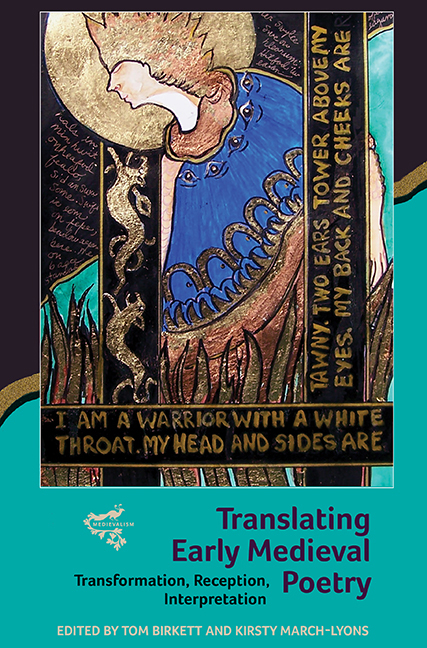9 results
Bibliography
-
- Book:
- Translating Early Medieval Poetry
- Published by:
- Boydell & Brewer
- Published online:
- 01 September 2018
- Print publication:
- 31 October 2017, pp 218-233
-
- Chapter
- Export citation
Index
-
- Book:
- Translating Early Medieval Poetry
- Published by:
- Boydell & Brewer
- Published online:
- 01 September 2018
- Print publication:
- 31 October 2017, pp 234-239
-
- Chapter
- Export citation
Frontmatter
-
- Book:
- Translating Early Medieval Poetry
- Published by:
- Boydell & Brewer
- Published online:
- 01 September 2018
- Print publication:
- 31 October 2017, pp i-iv
-
- Chapter
- Export citation
Contents
-
- Book:
- Translating Early Medieval Poetry
- Published by:
- Boydell & Brewer
- Published online:
- 01 September 2018
- Print publication:
- 31 October 2017, pp v-vi
-
- Chapter
- Export citation
Introduction: From Eald to New
-
-
- Book:
- Translating Early Medieval Poetry
- Published by:
- Boydell & Brewer
- Published online:
- 01 September 2018
- Print publication:
- 31 October 2017, pp 1-12
-
- Chapter
- Export citation
Acknowledgements
-
- Book:
- Translating Early Medieval Poetry
- Published by:
- Boydell & Brewer
- Published online:
- 01 September 2018
- Print publication:
- 31 October 2017, pp vii-vii
-
- Chapter
- Export citation
Contributors
-
- Book:
- Translating Early Medieval Poetry
- Published by:
- Boydell & Brewer
- Published online:
- 01 September 2018
- Print publication:
- 31 October 2017, pp viii-x
-
- Chapter
- Export citation

Translating Early Medieval Poetry
- Transformation, Reception, Interpretation
-
- Published by:
- Boydell & Brewer
- Published online:
- 01 September 2018
- Print publication:
- 31 October 2017
Miscellaneous Endmatter
-
- Book:
- Translating Early Medieval Poetry
- Published by:
- Boydell & Brewer
- Published online:
- 01 September 2018
- Print publication:
- 31 October 2017, pp 240-240
-
- Chapter
- Export citation



